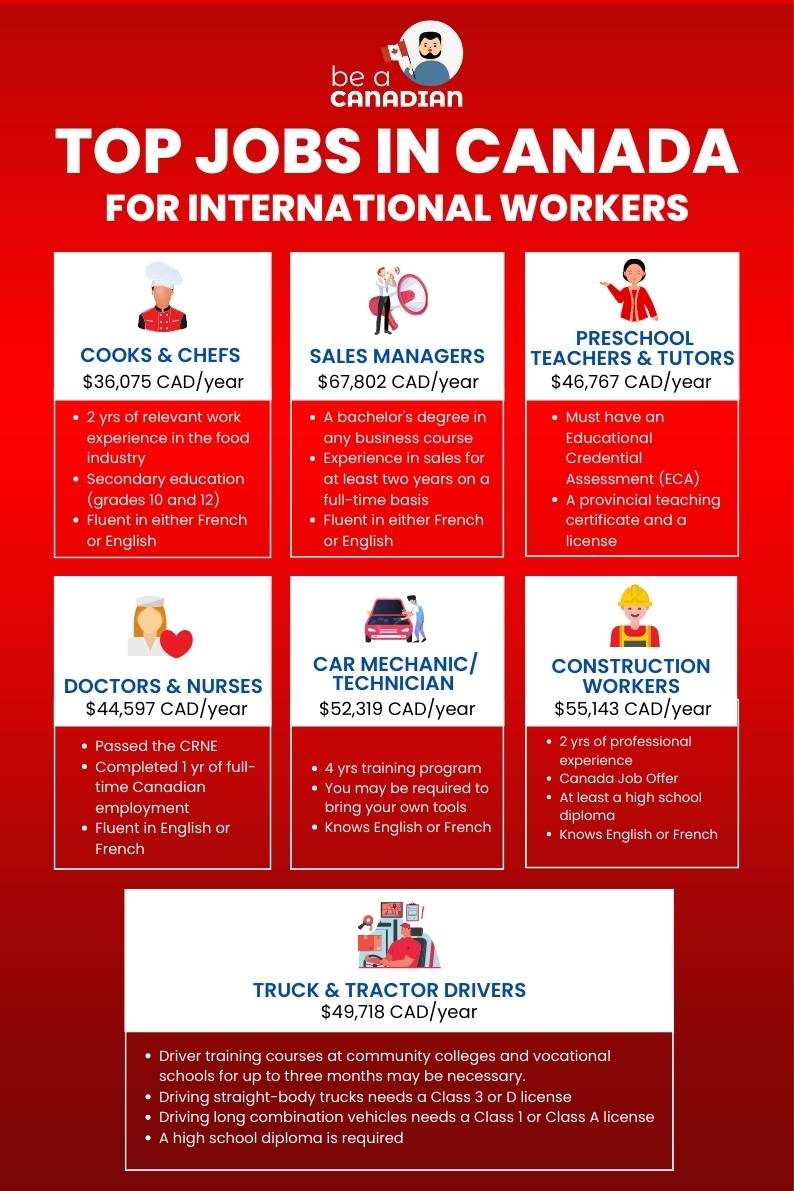Work in Canada:
Must-Read Tips for Foreigners
Home » Work in Canada Tips You Cannot Miss
Benefits of Working in Canada
Enjoy Canada's Generous Employee Benefits
- Diverse and Multicultural Environment for Foreign Workers
- High Salaries and Employee Insurance
- Chance to Become a Canadian Permanent Resident and Citizen
Take Advantage of Working in a Top-Notch Country
With one of the world’s largest economies, Canada is a prosperous nation with a high standard of living. The unemployment rate in Canada is lower than in most other nations.
Maternal and Paternal Benefits
Canada’s maternity and parental benefits provide financial help to parents who are unable to work because they are pregnant or have just given birth.
Provincial Healthcare is Completely Free of Charge.
If you’ve worked in Canada for at least six months, you’ll be eligible for free medical care. According to your province’s standards, you may have to wait some time before this coverage is available to you.
Additional Work in Canada Benefits
- Allowances to cover travel expenses
- Free daycare for your children
- Reduced rates on gym memberships
- Possibility of setting your own working hours
- Free usage of a business-related vehicle
Many Business Opportunities for Foreigners
- Visa programs for entrepreneurs, investors and startup owners
- Strong and fast-growing economy
- Plenty of skilled workers to choose from
- Many opportunities for growing your business and succeeding
Quick Links:
Top In-Demand Jobs in Canada for Foreigners
In recent years, Canada has become a top destination for skilled workers from around the world. With its strong economy and welcoming attitude towards immigrants, Canada offers many opportunities for those looking for a new home. Here are some of the most in-demand jobs in Canada for foreigners.
Basic Requirements for Working in Canada
You may start working in Canada this year if you acquire the following requirements:
1. A Job Offer from a Canadian employer
Having an official job offer from a Canadian employer is a must for many visa types and immigration programs. Even if it’s not required, it can greatly increase your chances of success.
2. Valid and Correct Documents, including LMIA if needed
The Canadian labor office, or rather ESDC, issues a special permit to the Canadian employer. In many cases, you will need to request an LMIA from your employer so you may submit it along with your application.
Even if LMIA is not required, make sure to provide all other required documents, have them in good quality and make sure none of them is expired.
3. Filled Out Work Permit Application
You will need to fill out an application for a Work Permit in your country of residence.
Tip: You may speed up your Canadian job search by contacting a reputable immigration agency that can offer you a job search consultant to help you throughout your process.
Types of Canada Work Permits for Foreigners
There are 4 types of work permits (programs, types of visa, etc.) to choose from when it comes to finding the most suitable option for you. Get to know each of them in the following:
Canada’s Temporary Work Visas allow you to work for a limited amount of time, which might be a few months or even years, depending on the kind of temporary visa you’ve applied for.
With this document, you may work for any company in Canada. These permits are not job-specific. An open work permit also gives you the ability to switch jobs if you wish to do so.
It allows young people from more than 30 countries to lawfully reside and work in Canada by granting them temporary work visas of 12 to 24 months. Your nationality also determines how long the permits are valid for.
International students who have just graduated from a Canadian post-secondary institution are eligible to apply for a post-graduation work permit. The Post-Graduation Work Permit Program can also help you with your application for permanent residency in Canada.
The Process of Applying for Work Visas in Canada
Every year, thousands of people from all over the world come to Canada to work. The process of applying for a work visa can be a bit complicated, but this video will help clear things up.
Employment Guide: How to Get a Job Offer in Canada
Looking for an easy-to-follow employment guide (tips, taxes, benefits, etc.)? Follow these simple tips!
📝 Create a Canadian-standard CV
In order to break into a new market, you’ll need to construct a professional CV that is specifically targeted at the Canadian market.
🏃♀️ Be Proactive and Apply for Many Jobs
Your dream job won’t find you on its own. Be active and submit your CV and applications to as many suitable jobs as you can find! Don’t get too focused on a specific job title or a specific city. Explore all of the opportunities and then make your choice!
🤝 Create a Strong Social Network
Having a professional social media presence, on Facebook, Twitter, Instagram, or LinkedIn, is essential. Reach out to relevant people, ask career advice and who knows – maybe your next career opportunity will find you online!
🏢 Try Canada-based Recruiting Agencies
Because so much of the legwork is taken care of for you, this is a popular approach.
Recruiting companies are working with both workers and employers in Canada. You may count on them to help you get a job and help employers fill open positions.
🍁 Contact Immigration Consultancies for Help
Because the immigration agency handles every step of the procedure, this is the most straightforward choice.
Immigration consultancies who have job search assistance services can assist you with:
- Putting you in touch with employers
- Drafting a CV and cover letter for you
- Providing advice on how to revise your LinkedIn profile
- Providing feedback on your language proficiency
Frequently Asked Questions (FAQs) About Work in Canada
The average monthly salary is $2,367.7 CAD a month for foreign workers.
Canada Job Bank gives job searchers in Canada or foreign workers the chance to find employment opportunities on the Job Bank’s website and mobile app. Job-hunting tools are also provided by them through this platform.
Employers in Canada may need to get an LMIA (Labor Market Impact Assessment) before recruiting a foreign worker. If the LMIA is positive, it will demonstrate that the position is in need of a foreign worker and there are no available locals who have the skills to fill it.
Finding a job in Canada as an immigrant might be tough. However, this does not just apply to Canada, but to all countries as well. Hiring immigration consultancies or other experts who can guide you through the process of obtaining a job in Canada is your best bet if you want a fast and painless experience.
Processing dates for LMIAs might vary widely, ranging from a few weeks to many months. For a work permit, the process might take up to eight months.
In order to be eligible for a work visa, generally all applicants must have an employment offer from a Canadian employer accompanied by a Labour Market Impact Assessment (LMIA) (LMIA). In very rare cases, foreign workers may be able to apply for a work visa without an LMIA or a job offer.
For foreigners, finding employment in Canada is surprisingly simpler than it used to be.
Many Canadian employers are in desperate need of foreign workers right now, which means that international workers have a greater opportunity than ever before to work in Canada!


